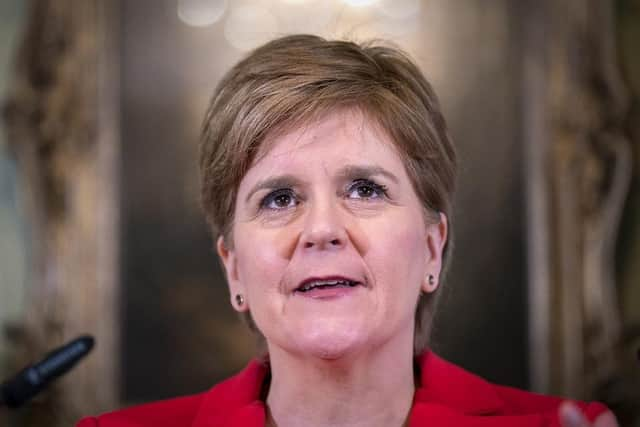Nicola Sturgeon resignation: Why her speech represented the end of an era for Scottish politics
That press conference room in Bute House is small, almost claustrophobic – more so when it is packed to the brim with members of the broadcast and print media, many well-known faces and adversaries to the First Minister.
Sturgeon was flanked by advisers, communications professionals, and Permanent Secretary John-Paul Marks. For such a seismic announcement in the Scottish political world, the venue belied the SNP leader’s stature as arguably the pre-eminent politician of her era.
Advertisement
Hide AdAdvertisement
Hide AdGone were the bombastic appeals to independence, replaced instead by words that had evidence of deep consideration. While they may have only been written on paper in recent weeks, they showed signs of being far from newly formed.


It is obvious time in office has impacted the SNP leader deeply and personally, drawing deep from her reserves – particularly during Covid-19. And while her resilience through difficult times is lauded by allies, that experience has left scars.
The decision, she said, had come from a position of “duty and of love, tough love” and was one that had bubbled away underneath the surface for months.
There was a sense of missed opportunity, as if those lost weekends to Cabinet papers and independence strategy meetings had finally caught up with her and that it was time for a return to normality, something she has not experienced for decades, underlined most by her mention of her niece and nephew, babies when she entered government and now turning 17.
Her resilience, however, has taken a beating in recent months. First the process of passing the Gender Recognition Reform Bill, then the ensuing controversy around trans prisoners, and before the New Year the Supreme Court defeat, has clearly taken its toll.
She is, the SNP leader repeated several times, a “human being”, urging a change in tone and approach within politics. The deepening polarisation of politics during her time in office was highlighted several times, though opponents will only have one name they blame for that.
Normally unflappable, the First Minister visibly struggled to handle her emotions, particularly when mentioning her family, closest friends and political allies, ultimately remaining calm and composed, in line with her handling of the darkest moments of her political life.
There were also admissions she believed she had become a drag on support for independence, a figure who defined the SNP and one who had become bigger than the merits of any given policy.
Advertisement
Hide AdAdvertisement
Hide AdSturgeon’s dominance of Scottish politics and the SNP, she implied, had become a drag on her party and her cause.
While the SNP leader will stay in politics, at least until the 2026 Scottish Parliamentary election, this was a speech that represented the end of her personal political dream of leading Scotland to independence as well as a career.
It also represents the end of the Sturgeon era, and the beginning of a new chapter in the independence chase.
Comments
Want to join the conversation? Please or to comment on this article.
